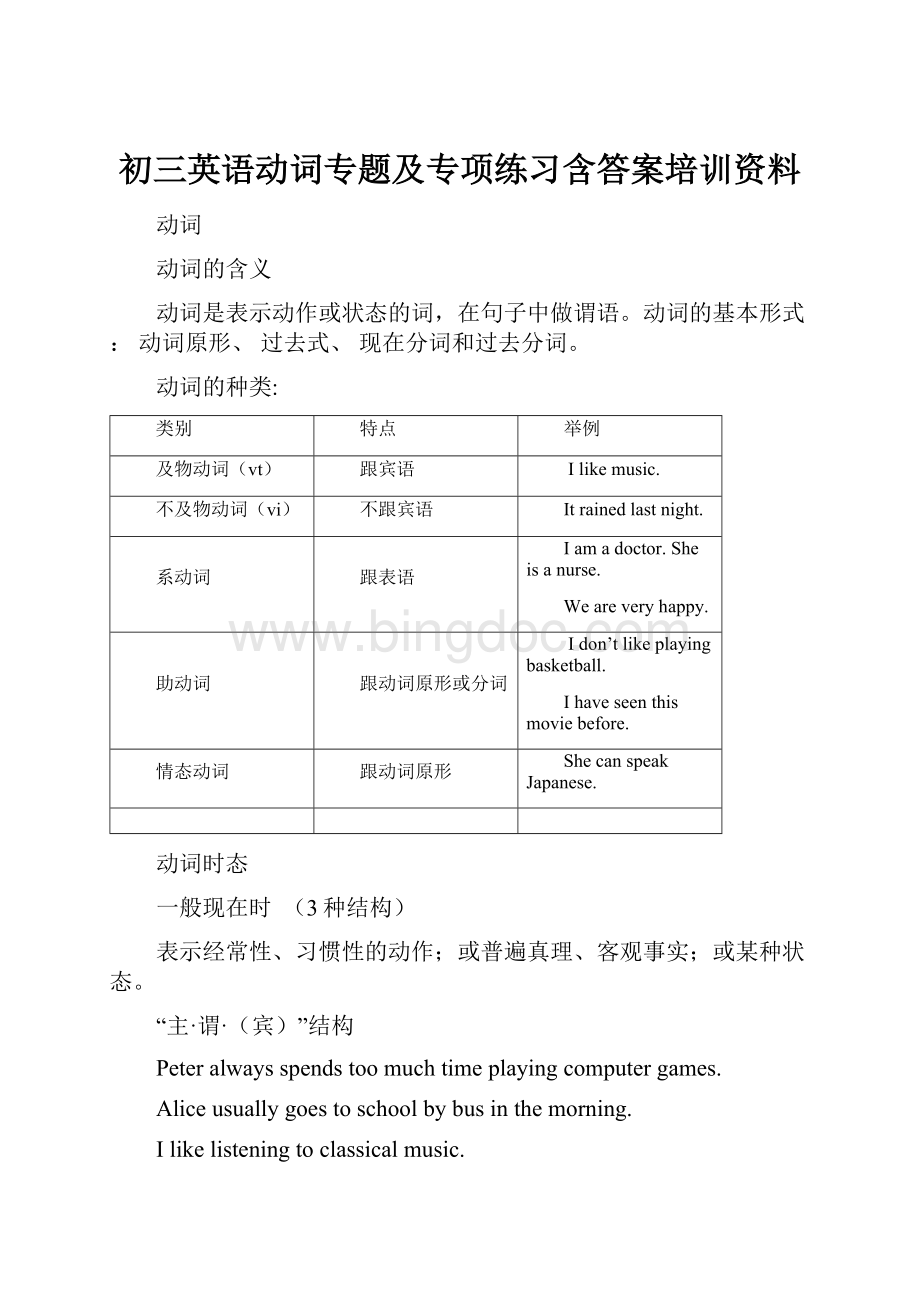初三英语动词专题及专项练习含答案培训资料.docx
《初三英语动词专题及专项练习含答案培训资料.docx》由会员分享,可在线阅读,更多相关《初三英语动词专题及专项练习含答案培训资料.docx(14页珍藏版)》请在冰点文库上搜索。

初三英语动词专题及专项练习含答案培训资料
动词
动词的含义
动词是表示动作或状态的词,在句子中做谓语。
动词的基本形式:
动词原形、过去式、现在分词和过去分词。
动词的种类:
类别
特点
举例
及物动词(vt)
跟宾语
Ilikemusic.
不及物动词(vi)
不跟宾语
Itrainedlastnight.
系动词
跟表语
Iamadoctor.Sheisanurse.
Weareveryhappy.
助动词
跟动词原形或分词
Idon’tlikeplayingbasketball.
Ihaveseenthismoviebefore.
情态动词
跟动词原形
ShecanspeakJapanese.
动词时态
一般现在时(3种结构)
表示经常性、习惯性的动作;或普遍真理、客观事实;或某种状态。
“主·谓·(宾)”结构
Peteralwaysspendstoomuchtimeplayingcomputergames.
Aliceusuallygoestoschoolbybusinthemorning.
Ilikelisteningtoclassicalmusic.
“There·be”结构
Thereisamaponthewall.
Therearesomebirdsinthesky.
“主·系·表”结构
It’sverycoldtoday.
Theearthisbiggerthanthemoon.
Myfatherisateacher.
动词第三人称单数
动词特征
构成
例词
一般动词
词尾加s
like-likes
以ch,sh,s,o,x结尾
记忆技巧:
吃(ch)蛇(sh,s)后喝XO
词尾加es
teach-teaches
do-does
go-goes
wash-washes
pass-passes
mix-mixes
fax-faxes(发送传真)
以y结尾
辅音字母+y,变y为i,再加es
study-studies
carry-carries
try-tries
元音字母+y,直接加s
play-plays
stay-stays
say-says
一般过去时(3种结构)
表示发生在过去的动作。
在一般过去时的句子中,动词必须用过去式.
动词过去式及过去分词的构成
规则变化
构成法
词例
(1)一般情况下加ed
work--worked--worked
play--played--played
(2)以e结尾的,加d
live--lived--lived
like--liked--liked
(3)以“辅音字母+y”结尾的,改y为i,再加ed.
study--studied--studied
cry--cried--cried
(4)以重读闭音节或r音节结尾,且末尾只有一个辅音字母的词,要双写这个辅音字母,再加ed.
stop--stopped--stopped
prefer--preferred--preferred
refer-referred-referred
occur-occurred-occurred
不规则变化(参考课本)
一般过去时常见的提示:
yesterday;thedaybeforeyesterday;last(week/month/year/Sunday--)
this---;justnow;---ago;after---;when---等等。
注:
当谓语动词是行为动词时,肯定句用动词的过去式表达,构成疑问句或否定句时,需借助did或didn’t构成,谓语动词要还原成原形。
例如:
Iwenttothezooyesterday.
Mymotherdidn’tgototheparklastweekend.
DidJimcometoseeyoulastnight?
.
现在进行时
表示目前正在发生或进行的动作。
(只有延续性动词有进行时;非延续性动词没有进行时)
主语+系动词(am/is/are)+现在分词
现在分词的构成
构成法
词例
(1)一般情况下加ing.
work--working;learn--learning
(2)以e结尾的,去掉e,再加ing.
live--living;take--taking
(3)以重读闭音节或r音节结尾,且末尾只有一个辅音字母的词,要双写这个辅音字母,再加ing.
sit--sitting;stop--stopping
chat--chatting;refer--referring
(4)以ie结尾的,要改ie为y,再加ing.
tie--tying;lie--lying
现在进行时的标志:
Look;Listen;now;atthemoment/atpresent
Look.Aliceisreadingamagazineoverthere.
Listen.PeterissingingaChinesesong.
AliceistalkingtoPeternow.
I’mlearningJapaneseatthemoment.
特殊情况:
非延续性动词没有进行时,它们的现在分词形式表示将来时。
主语+(am/is/are)+非延续性动词的现在分词:
表示将来时。
I’mgoingtoschoolnow.
MaryisleavingforNewYorksoon.
SpringFestivaliscoming.
I’marrivinginBeijing.
过去进行时
表示在过去的某时正在发生或进行的动作。
主语+系动词(was/were)+现在分词
Davidwasdoinghishomeworkat8o’clockyesterday.
Iwasdoingmyhomeworkathistimeyesterday.
TomwashavingbreakfastwhenMarycalledhim.
一般将来时
表示将要发生的动作,或计划或打算作某事。
主语+will+动词原形
主语+(am/is/are)+goingto+动词原形
主语+(am/is/are)+非延续性动词的现在分词:
例如:
Iwilltellyouthegoodnews.
JohnisgoingtovisitHangzhounextweek.
MyfatheriscomingtoQingdaotomorrow.
一般将来时常见的提示:
tomorrow;thedayaftertomorrow;nextweek;inthefuture;inthreedays;thisevening,soon,attheendofthisterm
一般将来时的用法
1.表示将来的动作或状态。
例如:
WewillgettoShanghaitomorrow.
2.在“祈使句+and/or+句子”这个结构中,“句子”用一般将来时。
例如:
Getupearly,andyouwillcatchtheearlybus.
Hurryup,oryouwillbelateforschool.
“begoingto+动词原形”与“will+动词原形”
begoingto和will在一般情况下可以互换,但是在下列情况下将来时要用will。
说明
例句
带有意愿色彩
Iwillhelpyoulater.
问对方是否愿意或客气的邀请或命令
Willyoupleaseclosethedoor?
Willyougowithme?
在时间、条件状语从句中,如果主句是一般将来时,用will
Mr.Wangwillcomeifitdoesn’train.
HewillcallusassoonashegetstoHongKong.
过去将来时
表示在过去的某时计划或打算作某事。
(间接引语/宾语从句)
主语+would+动词原形
主语+(was/were)+goingto+动词原形
主语+(was/were)+非延续动词的动名词
例如:
Ithoughtyouwouldhelptheoldman.
Marywasgoingtotakepartinthismeeting.
HesaidhewasleavingforHongKong.
现在完成时
含义:
现在完成时表示“过去的动作对现在所造成的结果或影响”.
汉语译文中经常含有“已经”、“曾经”、“还没有”等词语.
构成:
主语+have/has+过去分词例如:
Ihaveseenthismoviebefore.(结果:
我了解这部影片的内容)
Hehashadagoodeducation.(结果:
他的知识水平很高)
现在完成时常见的标志 :
sofar/uptonow ;recently ;inrecentyears ;before ;
inthepast… /inthelast…/overthepast…/overthelast…
since/for:
既可以用于 “现在完成时”,也可以用于“现在完成进行时”.
already/yet/ever/never/before:
既可以用于“现在完成时”,也可以用于“过去完成时”.
Ihavealreadyfinishedthework./Ihavejustfinishedthework.
Haveyoufinishedtheworkyet ?
Ihaven’tfinishedmyworkyet.
延续性动词与非延续性动词
延续性动词可以接一段时间;
非延续性动词后面不能接一段时间,如果要接一段时间,就必须把非延续性动词替换成相应的延续性动词.
come--behereHecameheretwohoursago.
Hehasbeenherefortwohours.
go--beout/beawayTheywentoutanhourago.
Theyhavebeenoutforanhour.
leave---beawayTomlefttenminutesago.
Tomhasbeenawayfortenminutes.
buy---haveIboughtthisdictionary10yearsago.
Ihavehadthisdictionaryfor10years.
begin---beonThefilmbeganfiveminutesago.
Thefilmhasbeenonforfiveminutes.
某些延续性动词(如:
lookfor,watch,waitfor,live,work,develop,teach,learn,study,rain等)与since或for连用时,表示“从过去的某一时刻起,一直持续到现在的动作”,它们的“现在完成时”可以与“现在完成进行时”互相替换。
Hehaslivedherefor20years.
Hehasbeenlivingherefor20years.
▲havebeento表示“曾经去过---” :
IhavebeentoBeijingbefore.
▲havegoneto表示“已经去了---” :
TheyhavegonetoJapan.
过去完成时主语+had+过去分词
表示在过去的某个动作之前发生的动作--“过去的过去”.
Bytheendoflastmonth,wehadlearned12Englishsongs.
Bythetimehegothome,alltheguestshadleft.
Whentheyarrivedattherailwaystation,thetrainhadalreadyleft.
BeforeIwenttobed,Ihadfinishedreadingthatbook.
AfterIhadfinishedreadingthebook,Iwenttobed.
“bytheendoflast---”只能用于“过去完成时”
Bytheendoflastmonth,wehadlearned5000Englishwords.
现在完成进行时主语+have/has+been+现在分词
表示从过去的某一时刻起到现在,一直在做某事。
IhavebeenwaitingforyourreplysinceIsentyoualetter
Ihavebeenlivingherefor20years
Ithasbeenrainingsincelastnight
Since1989,WangGanghasbeenworkinginthiscompany.
HehasbeenlearningEnglishfor10years.
专项练习
动词时态专项训练
1.HeoftentotheparkwithsomefriendsonSundays.
A.goB.goesC.isgoingD.hasgone
2.Tom’sfatherlisteningtoclassicalmusic.
A.likeB.don’tlikeC.likesD.isliking
3.yourmotherupearlyinthemorning.
A.Do/getB.Do/getsC.Does/getsD.Does/get
4.Look,theboysfootballontheplayground.
A.playB.playingC.areplayingD.isplay
5.PeterwentswimmingwithMikeyesterday,he?
A.didB.doesC.didn’tD.doesn’t
6.IaUFOintheskywhileIwastalkingawalkinthestreetjustnow.
A.sawB.haveseenC.willseeD.wasseeing
7.FredamodelplanewhenIwenttoseehim.
A.makesB.ismakingC.wasmakingD.made
8.I’lltellhertocallyoubackwhensheback.
A.willcomeB.comesC.hascomeD.iscoming
9.Myfathercigarettes,hethinksitisharmfulforhealth.
A.didn’tsmokeB.don’tsmoke
C.doesn’tsmokesD.doesn’tsmoke
10.I2000Englishwordsbytheendoflastterm.
A.hadlearnedB.havelearned
C.wouldlearnD.waslearning
11.Howlongyouthemobilephone?
A.haveboughtB.have/hadC.did/buyD.do/buy
12.MybrothertoLondonmanytimes,soheknowsLondonverywell.
A.wasgoingB.wentC.hasbeenD.hasgone
13.Iwanttoknowifyoufreetomorrowevening.Ifyoufree,I’dliketoinviteyoutodinner.
A.willbe/areB.are/willbe
C.are/areD.willbe/willbe
14.Listen,themusicverynice.
A.issoundingB.soundC.soundsD.issounded
15.ImybesttolearnEnglishwellfromnowon.
A.triedB.havetriedC.amtryingD.willtry
16.Ourteachertoldusthatlightfasterthansound.
A.travelledB.travelsC.hadtravelledD.istravelled
17.MrBrownisn’tathomenow.Hetohisoffice.
A.hadgoneB.hadbeenC.hasgoneD.hasbeen
18.Hesaidhewouldgotothemovieswithusifhefree.
A.willbeB.wouldbeC.isD.was
19.Jennytovisithergrandmathreedaysago.
A.wentB.goesC.hasgoneD.hadgone
20.TheGreensChinaforfiveyears.
A.hasbeeninB.havebeenin
C.hascometoD.havegoneto
21.Thereabasketballmatchinourschoolthedayaftertomorrow.
A.willhaveB.willbeC.wouldbeD.isgoingtohave
22.ItoHainanforvacationinthreedays.
A.wentB.goC.willgoD.wasgoing
23.HowlongyouFrenchbeforeyouwenttoParis?
A.had/studiedB.have/studied
C.do/studyD.would/study
24.Hi,Peter.Iyouwerehere.
A.don’tknowB.haven’tknown
C.hadn’tknownD.didn’tknow
25.Wewillgeteverythingreadybeforeshehere.
A.willcomeB.comesC.wouldcomeD.came
26.Tomhiscoatandthenwentout.
A.putonB.putsonC.hadputonD.wouldputon
27.Neitherofusinterestedinfolksongs.
A.wereB.amC.isD.are
28.IheardherinthenextroomwhenIgothome.
A.playB.playingC.toplayD.played
29.LindaTVsince6o’clockthismorning.
A.waswatchingB.hasbeenwatched
C.hadwatchedD.hasbeenwatching
30.Hetoworkinafactoryattheageof17.
A.beganB.hasbegunC.wouldbeginD.hadbegun
31.OnedaywhileIalongthestreet,Isomeonecallingme.
A.walked/heardB.waswalking/washearing
C.waswalking/heardD.walked/washearing
32.NeitherInorheinphysics.
A.areinterestingB.areinterested
C.isinterestingD.isinterested
33.Iinthebarforanhourbeforeshe.
A.hadwaited/arrivedB.waited/hadarrived
C.waswaitin